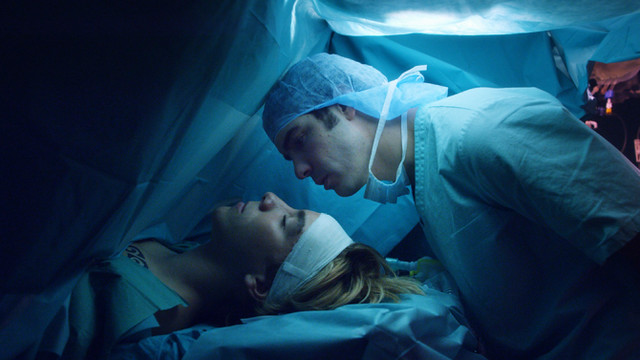
A young blonde boy Simon (Gabin Verdet) wakes in the pre-dawn winter morning, kisses his girlfriend who's still in bed, sneaks out of the window that’s facing the ocean in the distance, bikes to join his buddies to go surfing. The whole beginning sequence of Katell Quillévéré (Love Like Poison, Suzanne)'s Heal the Living has a fluidity of a movement and detached youthful spirituality of a Gus Van Sant movie.
The surf and the youthful bodies against the waves are all beautifully captured by her regular cinematographer Tom Harari. And this is what makes the following scene so tragic. On their way back from the beach, Simon’s friend falls asleep at the wheel and the car veers off the road and crashes. The crash is also almost poetically realized: capturing the boys’ lucid stage simply overlaying the image of the waves on the flat surface of the open road and its surroundings. Simon wasn’t wearing a seat belt. He falls into a coma and is pronounced brain dead.
The film is an organ transplant weepy: 'An accident cuts a young man's life short and gives another person a second chance in life' story. We've seen this before, many times. But Quillévéré elevates this Lifetime Network movie of the week premise to a higher level with her strong ensemble cast, including Emmanuelle Seigner, Kool Shen, Tahar Rahim, and Alice de Lencquesaing. She orchestrates them beautifully, as she did with her previous films. As usual she is gifted with making every one of her characters shine.
Based on a bestselling book by Maylis De Kerangal, Heal the Living examines Quillévéré’s familiar territory: the death of a loved one and how it affects the living. Through Simon, one way or another, we see the glimpse of other lives, both professional and private in equal measure.
There is a middle-aged rapping head surgeon (Bouli Lanners), an overworked nurse (Monia Chokri) daydreaming a sexual tryst in a hospital elevator, a good-hearted transplant specialist (Tahar Rahim of A Prophet, The Past) who has a tough job of convincing a grieving family to give consent, a mother of two grown-up sons who needs a heart transplant (Anne Dorval of Xavier Dolan's films)… the list goes on and on.
Then there is the film’s odd couple, French rapper Kool Shen (Abuse of Weakness) and Emmanuelle Seigner (Frantic, Diving Bell and the Butterfly) as the grieving parents of Simon, who are left with hard decisions. And they are improbably fantastic together. Shen’s working class, everyman attitude matches well with Seigner’s soft-featured maternal figure.
It's the space between the brain and the heart that makes us human. That's the space Quillévéré also explores. It can definitely turn corny in less assured hands. But the fluidity of the scenes, accompanied by Alexandre Desplat’s gorgeous score, shows what she is capable of if she has means to realize something more deep and complex through a visual, aural language.
Science has decided that the death of the brain is the end of a person. But it’s the stopping of the heart beat which has more of emotional resonance to us, as it is synonymous with love.
Quillévéré understands those connections and implies that in Heal the Living in a cinematic way. Every movement in the film has to do with being alive. Every stillness implies death. She understands that death is part of life. We lose somebody close and feel like time is standing still -- the camera movement becomes static.
But we go on living again -- and the camera moves again. I thought Suzanne was a flat-out masterpiece, even though it perhaps lacked cinematic flare. Deeply moving and thoughtful, Heal the Living is definitely her most mature work to date.
Heal the Living opens in New York on April 14 at the Quad Cinema.
No comments:
Post a Comment